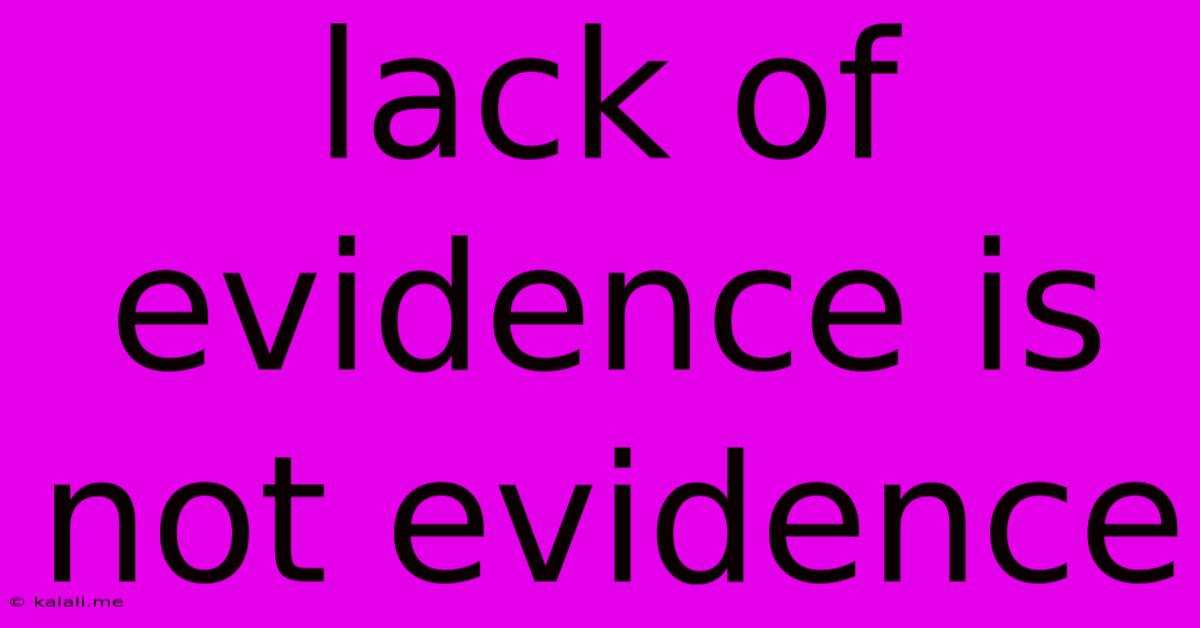Lack Of Evidence Is Not Evidence
Kalali
Jun 04, 2025 · 3 min read

Table of Contents
Lack of Evidence is Not Evidence: Understanding the Burden of Proof
The statement "lack of evidence is not evidence" is a crucial principle in logic, critical thinking, and particularly, scientific reasoning. It highlights the fundamental difference between absence of proof and proof of absence. This article delves into why this distinction is so important and how it impacts various aspects of our lives, from everyday decisions to complex scientific debates. Understanding this concept is vital for evaluating claims, forming informed opinions, and avoiding logical fallacies.
The core of the issue lies in the burden of proof. When someone makes a claim, the onus is on them to provide sufficient evidence to support it. The absence of evidence contradicting their claim doesn't automatically validate it. Think of it like this: just because you haven't found your keys doesn't prove they've been stolen; they could simply be misplaced.
The Logical Fallacy of Argument from Ignorance
Confusing lack of evidence with evidence of absence is a common logical fallacy known as argument from ignorance (also called appeal to ignorance). This fallacy assumes that because something hasn't been proven, it must be false (or conversely, because something hasn't been disproven, it must be true). This is flawed reasoning because our current knowledge is always incomplete. The absence of evidence simply means we don't yet have enough information to reach a conclusion, not that the claim is inherently false.
Examples in Different Contexts:
-
Science: Scientists often grapple with the lack of definitive evidence for certain hypotheses. The absence of evidence proving the existence of extraterrestrial life doesn't mean aliens don't exist; it simply means there's currently insufficient proof. Similarly, failure to find a cure for a disease doesn't prove it's incurable. Further research and investigation are necessary.
-
Law: In a court of law, the prosecution must present sufficient evidence to prove guilt beyond a reasonable doubt. The defense doesn't need to prove innocence; the prosecution must prove guilt. The lack of evidence against the defendant does not automatically mean they are innocent, but it weakens the prosecution's case.
-
Everyday Life: Consider someone claiming a specific brand of coffee is superior. The absence of evidence demonstrating its inferiority doesn't automatically prove it's the best; taste is subjective and other brands might be equally good or even better.
The Importance of Evidence-Based Reasoning
To avoid falling prey to the argument from ignorance, it’s crucial to embrace evidence-based reasoning. This approach emphasizes the importance of:
- Rigorous Research: Conducting thorough research to gather relevant data and evidence before forming conclusions.
- Critical Evaluation: Carefully analyzing the quality and reliability of evidence, considering potential biases and limitations.
- Open-mindedness: Being willing to reconsider beliefs in light of new evidence and acknowledge the limits of our current understanding.
- Falsifiability: Formulating hypotheses and claims that can be tested and potentially proven false.
In conclusion, recognizing that lack of evidence is not evidence is essential for clear thinking and informed decision-making. It encourages us to critically evaluate claims, avoid logical fallacies, and seek out robust evidence before accepting or rejecting any assertion. Understanding the burden of proof and embracing evidence-based reasoning are fundamental skills in navigating the complex world of information and forming sound judgments.
Latest Posts
Latest Posts
-
Briggs And Stratton Getting Too Much Fuel
Jun 05, 2025
-
What Does Wife To Boot Mean
Jun 05, 2025
-
Why Does Frodos Sword Glow In Moria
Jun 05, 2025
-
Star Wars Characters The Guy In Blue
Jun 05, 2025
-
Do I Need Unlock Bootloader To Flash Stock Firmware Lg
Jun 05, 2025
Related Post
Thank you for visiting our website which covers about Lack Of Evidence Is Not Evidence . We hope the information provided has been useful to you. Feel free to contact us if you have any questions or need further assistance. See you next time and don't miss to bookmark.